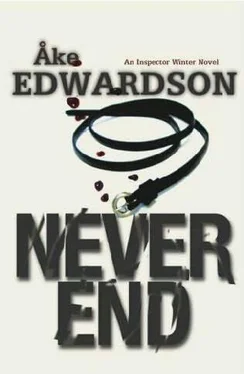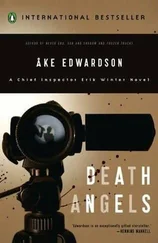"We are investigating a serious crime," said Winter.
"You almost make it sound as though I'm guilty," said Bielke.
"Why do you say that?"
"I beg your pardon?"
"Why do you say it sounds as if you are guilty?"
"Because that's the way it does sound, almost."
"Tell me about that telephone call."
"She called at about eleven to ask whether anybody had called her," Bielke said.
"Anybody in particular?"
"No, just anybody."
"And had anybody?"
"No."
"She'd borrowed a friend's mobile," Winter said.
"That's what you tell me."
"You couldn't hear the difference?"
"No. But I do remember that there was a different sort of background noise," Bielke said.
"She said she was outdoors."
"Yes."
"Anything to confirm that?"
"The call only lasted a few seconds."
Her own mobile was being repaired. Winter had had that confirmed.
"It's not clear who lent her a mobile," Winter said.
"Does it matter?"
"We're not clear about where Jeanette was for a few hours that night," said Winter. "Maybe even longer."
"You'll have to ask her. Again. 1 don't like it, but if you have to, you have to."
"I'm asking you, now."
"Wrong person."
Winter noticed that the man had changed during the course of the conversation. Or the interrogation. And he noted how much Bielke had changed since they'd met for the first time. He'd become… more aggressive. That could be due to Winter, or to Halders. Or it could be due to something entirely different.
"Don't you want to know?" Winter asked.
"What do you think?"
Winter didn't reply. He'd heard something from upstairs, footsteps, soft footsteps, even a stumble. Perhaps she'd been listening, but he would have noticed in that case. At that point Jeanette came into the room from the kitchen. It had been somebody else up the stairs. Irma Bielke wasn't at home, according to what Bielke had said when Winter arrived.
***
It was raining outside. Harder now. The garden was a mass of wet greenery. The temperature had fallen, but it was still warm. The sound of waves breaking against the rocks could be heard from the west.
Winter drove southward. He'd have to change his passenger-side windshield wiper. His vision to the right was blurred and greasy, like looking at houses and trees through a thin layer of jelly.
He had to wait at a crossroads where a section of road was being paved. His thoughts were faster than the efforts of the workmen.
The girls had been to the same place. Beatrice and Angelika. That's where they'd been found, where they'd been murdered. Or within a few meters of there. And that's where Jeanette had been attacked. She'd said it was there. And why doubt her?
What did it mean? What was the significance of the location?
He'd been delving into the case backward… to Beatrice… but had somebody else been doing the same thing? Was there a copycat? He hated the word. But what had happened to Beatrice was no secret. Nor where it had happened. Was that knowledge being exploited by somebody? A copycat? Was he approaching the case from the wrong point of view? Should he be looking forward instead of backward?
One of the workmen waved him on, past the vehicle that looked like a field kitchen for an army battalion, or something out of a Mad Max film. The hot asphalt was simmering in the rain, giving off steam. It smelled like an infantry attack coming through the car windows.
They had traced the three girls' last hours in as much detail as they could. He was including Jeanette in this aspect of the investigation. There was another peculiarity. She was still alive, but what had happened to her that evening before the crime was hardest of all to work out. There were fewer witnesses. Several couldn't remember.
He'd spent ages poring over the map, trying to figure out if they'd followed the same route to the park, to the rock, the opening, the bushes. Maybe there was a common route, or something that amounted to the same thing. If you added up all the evidence from friends about where they'd been and what they'd done and what they were going to do that night, there was something like a route that Beatrice, Angelika, and Jeanette might have taken before they came up against the rapist. It started to the north of the city center, and everybody knew where it ended.
North of the city center. What had they been doing there? It must have been near the river, the old harbor, or around the opera house. Or on the other bank, perhaps? Winter had read the case notes backward and forward and over and over again, but hadn't found a place mentioned where they might all have started off on the same journey. Was it all a coincidence? He didn't know, but he would keep at it. He would force his way into the reality of the map, into the very spot.
He'd been looking for some connection between the cases, and here one was-extremely vague at the moment, but even so. What else was there for him to do?
Winter turned left. Angelika Hansson's father was at the door waiting for him, just like last time.
***
"Leave me on my own in here for a while," said Winter, and Lars-Olof Hansson closed the door on him. Winter started looking around Angelika's room. He needed to start from the beginning all over again. He opened the left-hand door of the wardrobe.
There was nothing in the wardrobehe hadn't seen before.
Nobody had moved the clothes since he and Bergenhem had been there on their first search and removed sweaters and pants, a job he wouldn't wish on his worst enemy. He had an innate reluctance to touch dead people's clothes. He wasn't cut out to be a forensics officer. Those clothes would never be worn again. He'd seen it before: they'd lie there for years on their shelves and in their drawers, just as all the furniture would stay exactly where it had been, the papers would still be on the desk, the books on their shelves, the few ornaments would be untouched.
They were all concrete memories now, memories they didn't want in that house, but they didn't have the strength to obliterate them. Or the will. Or both, he thought, as he closed the wardrobe door.
What am I looking for? If he knew, he wouldn't be here, intruding on the despairing parents in the next room. If he knew, he would already have found it, taken it away to be examined under a brighter light.
A secret.
The thought had been in the back of his mind since he'd spoken to Jeanette's father that first time. There was a secret. Either the father or the daughter was hiding something. Maybe both of them. Something they hadn't said. It wasn't something he could point to like a physical piece of evidence, but it had to do with the crime committed on the daughter, the rape. He couldn't pin it down, not yet. But he could sense it. And Halders could sense it. He needed Halders. This was a case for Halders as well, a complicated case that required a sort of thinking that aimed straight for the target, without too many sidetracks.
And here he was now, in this room that would only ever allow in a mixture of half light and half darkness through the closed Venetian blinds.
He sat down at the desk and looked at a photo of Angelika on a jetty by the sea. A young black body and a smile as big as the horizon, and just as white.
These confounded photographs that took no account of the future. He had already stared at a thousand pictures similar to this one, like a clairvoyant predicting a tragedy that is going to happen. Everything in photographs like these acquires a significance different from what one sees on the surface, it seemed to him. When I look at this picture, it's as if I'm coming to that jetty from the future, with a death announcement.
Читать дальше












